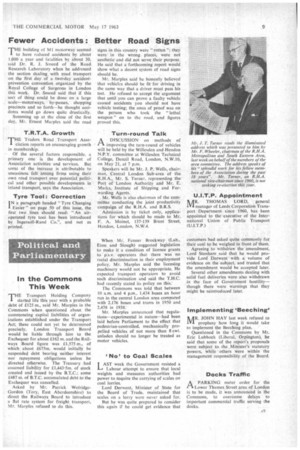1 and.
Page 11

If you've noticed an error in this article please click here to report it so we can fix it.
Parlia. Iti-Ea.try
In the Commons This Week
'THE Transport Holding Company I started life this year with a probable debt of 1125 m., said Mr. Marples in the Commons when questioned about the commencing capital liabilities of organizations established under the Transport Act: these could not yet be determined precisely. London Transport Board would be liable through him to the Exchequer for about £162 m. and the Railways Board figure was £1,575 m., of which about £675m. would initially be suspended debt hearing neither interest nor repayment obligations unless he directed otherwise. The Treasury had assumed liability for £1,443.5m. of stock created and issued by the B.T.C.; some £487 m. of B.T.C. accumulated debt to the Exchequer was cancelled.
Asked by Mr. Patrick WolridgeGordon (Tory. East Aberdeenshire) to direct the Railways Board to introduce a flat rate system for freight transport, Mr. Marples refused to do this. When Mr. Fenner Brockway (Lab., Eton and Slough) suggested legislation to make it a condition of licence grants to pls.v. operators that there was no racial discrimination in their employment policy, Mr. Marples said the licensing machinery would not be appropriate. He expected transport operators to avoid such discrimination and said the T.H.C. had recently stated its policy on this. The Commons was told that between 10 a.m. and 4 p.m., 1,434 buses an hour run in the central London area compared with 2.176 buses and trams in 1950 and 2,458 in 1938: Mr. Marples announced that regulations—experimental in nature—had been laid before Parliament to the effect that pedestrian-controlled, mechanically propelled vehicles of not more than 8 cwt. unladen should no longer be treated as motor vehicles.
'No' to Coal Scales I AST week the Government resisted a J--• Labour attempt to ensure that local weights and measures authorities had power to require the carrying of scales on coal lorries.
Lord Derwent, Minister of State for the Board of Trade, maintained that scales on a lorry were never asked for.
But he was quite prepared to consider this again if he could get evidence that customers had asked quite commonly for their coal to be weighed in front of them.
Agreeing to withdraw the amendment, Lord Stonharn said that he would provide Lord Derwent with a volume of evidence on the subject, and trusted that the amendment would be accepted later.
Several other amendments dealing with solid fuel deliveries were also withdrawn in the face of Government hostility— though there were warnings that they might be reintroduced later.
Implementing 'Beeching' MR. JOHN HAY last week refused to prophesy how tong it would take to implement the Becching plan.
Questioned in the Commons by Mr. Eric Lubbock (Liberal, Orpington), he said that some of the report's proposals were subject to the .Minister's statutory powers, while others were within the management responsibility of the Board.
Docks Traffic rtA PARKING meter order for the Lower Thames Street area of London is to be made, it was announced in the Commons, to overcome delays to important commercial traffic serving the docks.












































































































